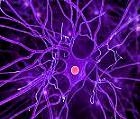 **The following is a press release from Amarantus BioSciences highlighting promising data in Parkinson’s Disease for its anti-apoptosis therapeutic protein MANF.**
**The following is a press release from Amarantus BioSciences highlighting promising data in Parkinson’s Disease for its anti-apoptosis therapeutic protein MANF.**
SUNNYVALE, Calif., Nov. 27, 2012 /PRNewswire/ — Amarantus BioSciences, Inc. (AMBS), a biotechnology company developing new disease-modifying treatments and diagnostics for Parkinson’s disease and Traumatic Brain Injury centered on its proprietary anti-apoptosis therapeutic protein MANF, today announced that the Company has successfully completed experiments demonstrating that MANF has an excellent diffusion profile in the striatum of rat brains. The striatum is located in the brain, and is partially responsible for proper movement as part of the basal ganglia network. The striatum becomes severely compromised in Parkinson’s disease due to neurite retraction from dopaminergic neurons located in the substantia nigra. The data generated in this study show that when compared to GDNF, a neurotrophic factor currently in a Phase 2 clinical trial for Parkinson’s disease, MANF had a significantly higher volume of distribution when delivered to the striatum. These results are part of on-going animal studies to determine the best localization of delivering MANF to the brain in Parkinson’s disease human clinical studies.
“The data obtained in this study provide strong evidence that volume distribution from the site of delivery in the brain is unlikely to be an impediment to MANF’s clinical progress,” said John W. Commissiong, PhD, Chief Scientist at Amarantus. “Volume distribution from the site of delivery appears to have been one of the key shortfalls of previous clinical trials of neurotrophic factors in Parkinson’s disease. These results provide a higher degree of certainty that MANF is unlikely to fail in the clinic due to inadequate diffusion volumes.”
In studies conducted by Dr. Steven Gill’s laboratory at the University of Bristol, MANF and GDNF were injected directly into the striatum of separate groups of rats in order to mimic as closely as possible the treatment setting in humans. Seven days following delivery under best available conditions, MANF’s diffusion volume was ~30% greater than GDNF’s.
“The results of this study provide further support to MANF’s real-world potential as a disease-modifying treatment for Parkinson’s disease, and potentially other brain disorders,” said Gerald E. Commissiong, President and CEO of Amarantus. “Diffusion from the site of delivery in the brain has been a key problem plaguing the development of other neurotrophic factors for Parkinson’s disease for some time. We now have further evidence that MANF appears to have added biological advantages over other neurotrophic factors in development, and the Company intends to leverage these results as we continue to advance our Parkinson’s program, as well as explore additional applications for MANF in orphan disease applications. The Company is currently evaluating various delivery technologies to clinically deliver MANF to the brain in Parkinson’s disease, and will update the market of its intentions as definitive agreements emerge.”
Large pharmaceutical companies have shown significant interest in neurotrophic factors for Parkinson’s disease for over two decades. In 1993, Amgen acquired Synergen for $262 million shortly after Synergen successfully completed studies using GDNF as a protein therapeutic in animal models of Parkinson’s disease. In 2007, Genzyme entered into a $150 million partnership with Ceregene to gain access to ex-U.S. marketing rights Neurturin after Ceregene successfully completed a Phase 1 clinical study demonstrating safety for Neurturin as a gene therapy product. Amarantus owns composition of matter and method of use patents for MANF, including claims for use of MANF as a protein therapy, gene therapy and as an adjuvant within the context of cell therapy.
About Amarantus BioSciences, Inc.
Amarantus BioSciences, Inc. is a development-stage biotechnology company founded in January 2008. The Company has a focus on developing certain biologics surrounding the intellectual property and proprietary technologies it owns to treat and/or diagnose Parkinson’s disease, Traumatic Brain Injury and other human diseases. The Company owns the intellectual property rights to a therapeutic protein known as Mesencephalic-Astrocyte-derived Neurotrophic Factor (“MANF”) and is developing MANF-based products as treatments for brain disorders. The Company also is a Founding Member of the Coalition for Concussion Treatment (#C4CT), a movement initiated in collaboration with Brewer Sports International seeking to raise awareness of new treatments in development for concussions and nervous-system disorders. For further information please visit www.Amarantus.com.
Forward Looking Statements
This press release contains forward-looking statements within the meaning of the Private Securities Litigation Reform Act of 1995. Such statements include, but are not limited to, statements about the possible benefits of MANF therapeutic applications and/or advantages presented by Amarantus’ PhenoGuard technology, as well as statements about expectations, plans and prospects of the development of Amarantus’ new product candidates. These forward-looking statements are subject to a number of risks, uncertainties and assumptions, including the risks that the anticipated benefits of the therapeutic drug candidates or discovery platforms, as well as the risks, uncertainties and assumptions relating to the development of Amarantus’ new product candidates, including those identified under “Risk Factors” in Amarantus’ most recently filed Annual Report on Form 10-K and Quarterly Report on Form 10-Q and in other filings Amarantus periodically makes with the SEC. Actual results may differ materially from those contemplated by these forward-looking statements Amarantus does not undertake to update any of these forward-looking statements to reflect a change in its views or events or circumstances that occur after the date of this presentation.